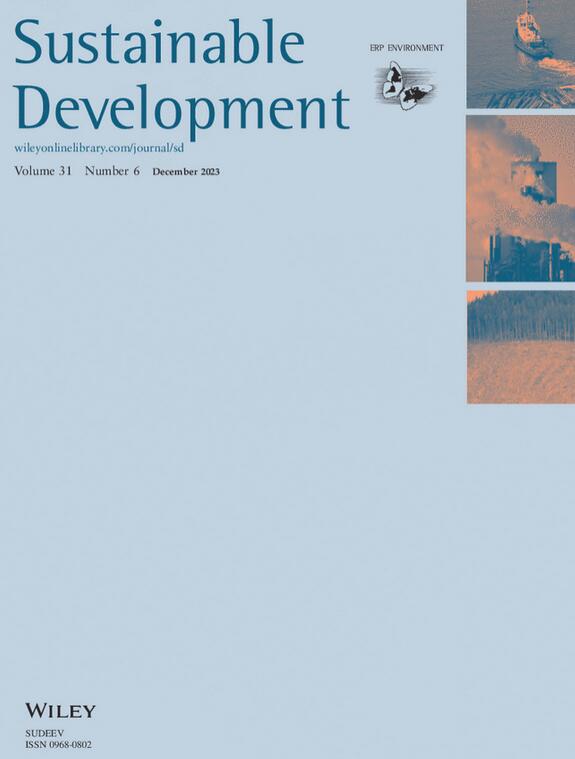Sustainable development through biomimicry: Enhancing circular economy practices for environmental sustainability
IF 9.9
1区 环境科学与生态学
Q1 DEVELOPMENT STUDIES
引用次数: 0
Abstract
Responding to the urgent global need for sustainable development, this study investigates how biomimicry can be integrated with the circular economy to promote environmental sustainability. Through an extensive review of literature, existing research, and case studies, we critically examine the application of biomimicry principles in enhancing circular economy practices. Our methodology synthesises insights from across disciplines, employing a thematic and gap analyses to uncover prevalent trends and identify research deficits. Building on Janine Benyus' seminal biomimicry work, we introduce a novel framework derived from Life's Principles to evaluate the sustainability of circular economy efforts, focusing on their consistency with or deviation from biomimetic principles. Our research finds a significant correlation between the circular economy's emphasis on reducing waste and improving resource efficiency and biomimicry's focus on nature‐inspired sustainable design. We pinpoint “resource efficiency” and “eco‐friendly chemistry” as primary areas where circular economy measures reflect biomimetic ideals. However, our analysis also reveals a considerable gap in incorporating local socio‐economic factors into circular economy frameworks. This oversight highlights the necessity for in‐depth research into how circular economy initiatives can be tailored to enhance socio‐economic resilience and community well‐being. By underscoring these parallels and identifying key research opportunities, our article elucidates how biomimicry could drive more effective circular economy practices. We argue that future research should focus on bridging the identified gap by exploring how circular economy models can incorporate local socio‐economic considerations, thereby ensuring more impactful sustainability outcomes.通过生物仿生学实现可持续发展:加强循环经济实践,促进环境可持续性
为满足全球对可持续发展的迫切需求,本研究探讨了如何将生物模拟与循环经济相结合,以促进环境的可持续发展。通过对文献、现有研究和案例研究的广泛回顾,我们批判性地审视了生物模仿原则在加强循环经济实践中的应用。我们的研究方法综合了各学科的见解,采用专题分析和差距分析来揭示普遍趋势并找出研究缺陷。在雅尼娜-贝纽斯(Janine Benyus)开创性的生物仿生学工作基础上,我们引入了一个源于 "生命原则 "的新框架,以评估循环经济工作的可持续性,重点关注其与生物仿生学原则的一致性或偏离性。我们的研究发现,循环经济强调减少浪费和提高资源利用效率,而生物仿生学则注重自然启发的可持续设计,两者之间存在着显著的关联。我们指出,"资源效率 "和 "生态友好型化学 "是循环经济措施反映生物模拟理想的主要领域。然而,我们的分析还显示,在将当地社会经济因素纳入循环经济框架方面还存在相当大的差距。这一疏忽凸显了深入研究如何调整循环经济措施以提高社会经济复原力和社区福祉的必要性。通过强调这些相似之处并确定关键的研究机会,我们的文章阐明了生物仿生学如何能够推动更有效的循环经济实践。我们认为,未来的研究应侧重于缩小已发现的差距,探索循环经济模式如何纳入当地的社会经济因素,从而确保取得更具影响力的可持续发展成果。
本文章由计算机程序翻译,如有差异,请以英文原文为准。
求助全文
约1分钟内获得全文
求助全文
来源期刊

Sustainable Development
Multiple-
CiteScore
17.30
自引率
11.20%
发文量
168
期刊介绍:
Sustainable Development is a publication that takes an interdisciplinary approach to explore and propose strategies for achieving sustainable development. Our aim is to discuss and address the challenges associated with sustainable development and the Sustainable Development Goals. All submissions are subjected to a thorough review process to ensure that our readers receive valuable and original content of the highest caliber.
 求助内容:
求助内容: 应助结果提醒方式:
应助结果提醒方式:


